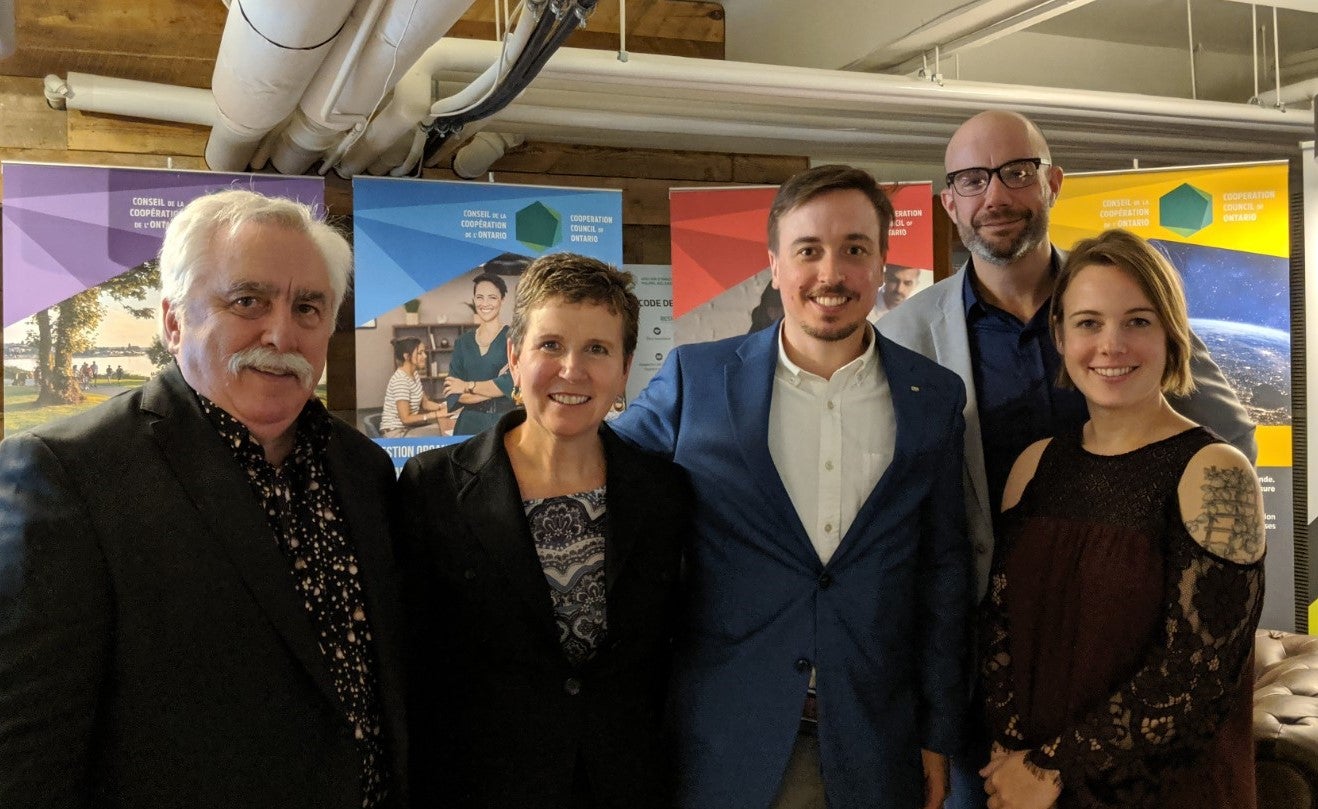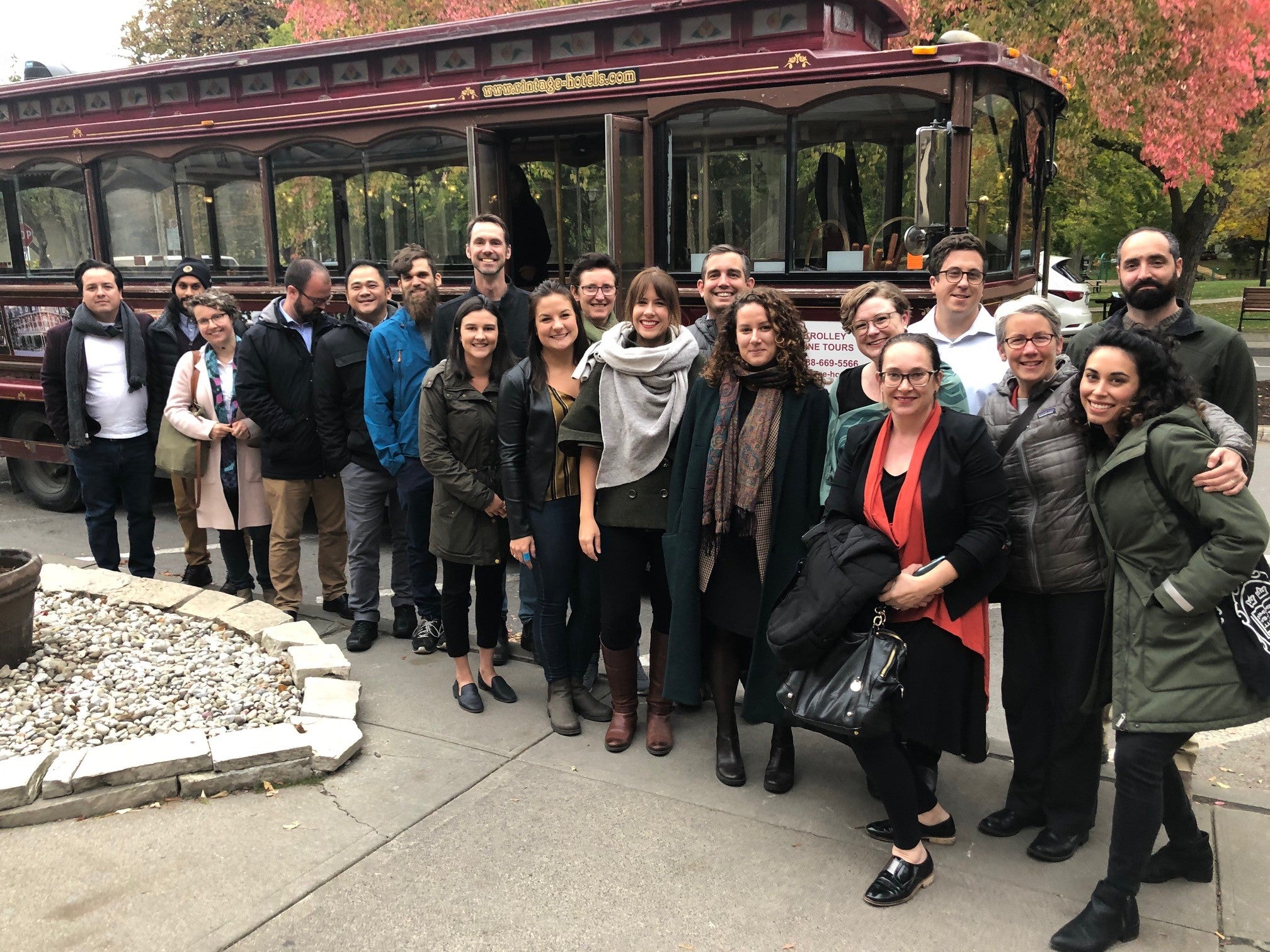First steps
The Legacy Leadership Lab's 18-month initiative began its outward-facing operations in October. Some new developments include:
- A full website to provide news and information, and to distribute L3 Workshop content, learning materials, and of course, this blog.
- A Facebook page, a Twitter handle, and a LinkedIn group, all dedicated to monitoring and sharing relevant news and ideas in the fields of social and co-operative entrepreneurship, social finance, and social purpose conversions.
- Chats with many organizations and professionals that will play key roles in L3 as the Workshops and co-creation begins.
Events and networking
L3 also took part in a panel discussion as part of the Forum Ontario-Québec sur l'économie sociale et cooperative, a joint initiative by the Conseil de la coopération de l'Ontario, the Chantier de l'économie sociale, and the Conseil québecois de la cooperation et de la mutualité. This French language event was held in the beautiful Atelier d'innovation sociale Mauril-Belanger on the Saint Paul University campus in Ottawa. The panelists included L3 Project Manager Meg Ronson, alongside co-operative entrepreneurs Mario Fortin of Cinéma Beaubien in Quebec and Nicole Guertin of Café Meteor Bistro in Ontario, and Claude-André Guillotte, a co-operative educator and researcher from the University of Sherbrooke. Jean-Pascal Dumont led the panel on behalf of the Centre de transfert d'entreprise de Quebec, an ahead-of-the-curve organization in Quebec dedicated to supporting exiting and retiring business owners and their successors.

Pictured (left to right): Mario Fortin, Nicole Guertin, Jean-Pascal Dumont, Claude-André Guillotte, Meg Ronson at the Forum Ontario-Québec sur l'économie sociale et coopérative
The panel discussed the long tradition of co-operative conversions, a social purpose conversion that transfers a conventional business into some form of co-operative. While optimistic about the future of co-operative conversions in their respective provinces, the panelists also each had words of caution about taking on a conversion lightly. Conversions require commitment, perseverance, and patience. The end result, however, can be extraordinarily empowering and invigorating for the entire community.
L3 was also invited to the Ontario Co-operative Association's Annual General Meeting in October, at which the OCA's board, staff, and members discussed the future of the association, its continued efforts to advocate for co-operatives in the province, and its dedication to fostering an environment for co-ops to start and to thrive.
Rural on Purpose hosted an online "Murmuration" in October to discuss youth engagement in rural areas that L3 attended. The panel discussed their successful local initiatives designed to get kids and youth involved in their communities and in entrepreneurship, but also how youth can and should be a valuable voice to consult in community economic development. L3 sees youth engagement as a vital way to sustain local economies: keeping children and youth informed, and assessing their unique needs and challenges, allows a community to keep its doors open to revitalization and change.
L3 also participated in the first Annual General Meeting for TRANSFORM, an international collaboration promoting sustainable small business led by Sarah Burch, University of Waterloo Associate Professor and Canada Research Chair in Sustainability Governance and Innovation. Both of L3’s Research Assistants presented on current sustainable enterprises they play critical leadership roles in.

Attendees at the TRANSFORM AGM
Aleksandra Szaflarska presented on her work as a co-founder of Together We’re Bitter, Ontario’s first co-operatively owned brewery, while Sean Campbell talked about his work leading the Union Sustainable Development Co-Operative, an investment co-operative that buys and manages multi-unit residential and commercial properties for the environmental, social, and economic benefit of Waterloo Region. As L3 grows we are looking to research collaborations like TRANSFORM to ensure that we are bringing the most cutting-edge sustainability research from around the world to L3’s participants.
Did you know... ?
Out in the world in October, Thomson Reuters named Canada the best country in which to start a social enterprise. The ranking is based on a poll investigating several factors like government support, attracting skilled staff, public understanding, and access to investment.
It is encouraging news for L3's work, since successful social purpose conversions will need a supportive national infrastructure, dedicated financing, and a lively business and social network.
Up and coming
L3 will be launching a call for sponsors in the month of November. L3 Workshops will be happening in major cities across Canada, and travel and accommodation expenses to attend the Workshops may present a barrier to attendance for some key players in the field of social purpose conversion. Sponsoring L3 will ensure a strong environment for social innovation by bringing a diverse collection of participants to the table at each Workshop. Contact Meg at mronson@uwaterloo.ca to inquire.
About Legacy Leadership Lab (L3)
L3 is an 18-month initiative by the Waterloo Institute for Social Innovation and Resilience, funded by the Government of Canada’s Investment Readiness program. We are leading five Workshops from coast to coast to help build expert-driven solutions for Canada’s transitioning small business community. During these Workshops, the we will develop market interventions and prototypes that allow conventional and social finance players, business service providers, and community leaders to facilitate social purpose conversions of existing businesses in their own towns.
About Waterloo Institute for Social Innovation and Resilience (WISIR)
WISIR is a research institute at the University of Waterloo’s School of Environment, Enterprise and Development committed to generating trans- and inter-disciplinary knowledge about social innovations and the social innovation process (the dynamics of learning, adaptation and resilience). Our approach is to pursue collaborative research and projects that bridge University of Waterloo departments, involve researchers from around the world, and engage those beyond academia. We seek to mobilize this knowledge through a range of new curriculum offerings and training opportunities - both within and outside of a university setting.